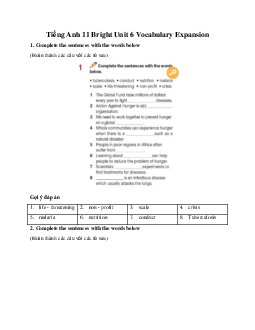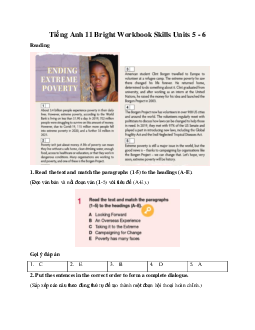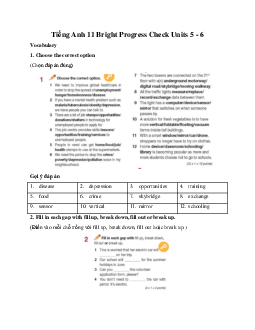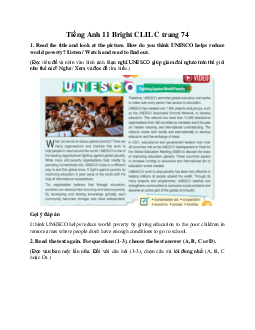



Preview text:
Tiếng Anh 11 Bright Unit 6 Introduction Vocabulary Global problems 1. Listen and repeat. (Nghe và lặp lại.)
Pronunciation /θ/ - /ð/
2. Listen to the sentences. Underline the words with a /θ/ sound and circle the words
with a /ð/ sound. Then listen again and repeat. Practise saying them with a partner.
(Nghe các câu. Gạch dưới các từ có âm /θ/ và khoanh tròn các từ có âm /ð/. Hãy nghe và
nhắc lại. Thực hành nói chúng với bạn của bạn.) Gợi ý đáp án
3. Listen and match the speakers (A-C) to the social problems (1-6) in Exercise 1.
What problems are they talking about?
(Nghe và nối người nói (A-C) với các vấn đề xã hội (1-6) trong Bài tập 1. Họ đang nói về vấn đề gì?) Gợi ý đáp án A. 6 B. 4 C. 3
Lời giải chi tiết
- Speaker A: Racism and discrimination against people from different
backgrounds/nationalities. – Social problem 6
- Speaker B: Food insecurity and hunger. – Social problem 4
- Speaker C: Lack of access to healthcare and medicine. – Social problem 3 Nội dung bài nghe Speaker A
The other day at school, some kids were talking badly about a new student from another
country. I really don't understand how people can behave badly like that or think they are
better just because the other person has different skin color or nationality. Personally, I
like to meet people from other places or cultures. I find them so interesting. Anyway, it's
all about respect and what we can learn from each other. Speaker B.
I am so excited to be part of my school's food drive. We are collecting foods from the
community and businesses and will deliver it to families in need. There is so much food
we need to make sure everyone has enough to eat. Speaker C.
There are so many people in the world who can't easily go to a doctor or get medicine if
needed. As a result, they get sicker and sicker. We have to make sure that everyone gets
the medicine they need so that we can avoid sicknesses. We also have to make sure
medicines are available to all who need them, no matter what the costs are.
4. What can we do to solve the problems in Exercise 1? Use the following ideas or
your own ideas to discuss.
(Chúng ta có thể làm gì để giải quyết các vấn đề trong Bài tập 1? Sử dụng những ý kiến
sau đây hoặc ý tưởng của riêng bạn để thảo luận.) Gợi ý đáp án
A: What can we do to solve the problem of war?
B: We can stop supporting the countries that started the war
A: What can we do to solve the problem of disease?
B: We can offer free medicines to sick people.
A: What can we do to solve the problem of hunger?
B: We can collect food for families in need.
A: What can we do to solve the problem of unemployment? B: We can create more jobs.
A: What can we do to solve the problem of racism?
B: We can learn to respect other’s nationalities




